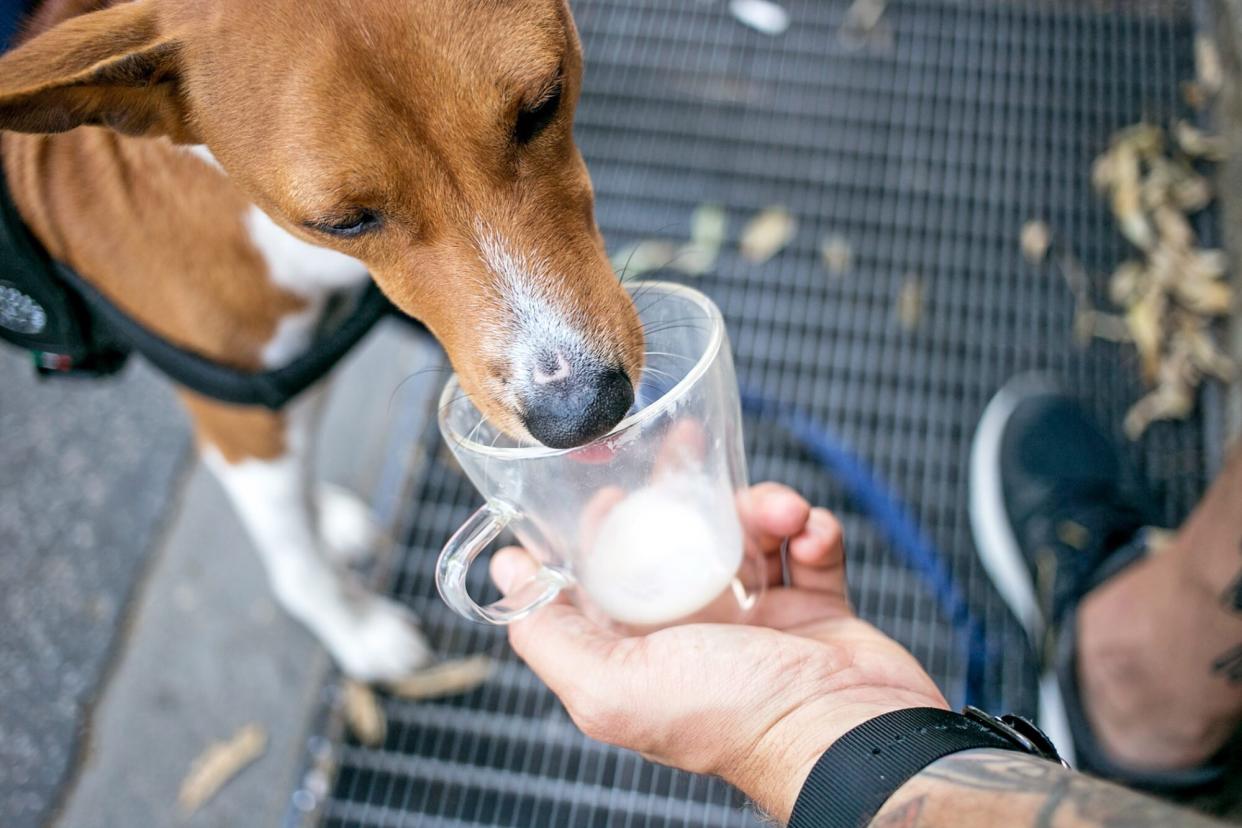Can Dogs Drink Milk? Here's Why Dairy Might Not Be the Best for Your Doggo

BublikHaus / Shutterstock
TABLE OF CONTENTS
On This Page
Is Milk Good or Bad for Dogs?
Can I Give My Dog Milk for Constipation?
Can Dogs Drink Plant-Based Milks?
Are Dogs Lactose Intolerant?
Does your canine companion give you those hard-to-resist puppy eyes while you're indulging in a tall glass of milk? You might wonder "can dogs drink milk?" as you take another sip, debating whether or not you should share.
After all, dogs drink their mother's milk as puppies … but what does that mean for cow's milk or dairy-free alternatives?
While milk is not toxic to dogs—meaning your pup can technically have a lick!—it's not recommended that they drink it, and the reasons why might surprise you.
Is Milk Good or Bad for Dogs?
Milk is an excellent source of calcium, potassium, and vitamin D. But is it at all beneficial for our thirsty pups?
Jamie Whittenburg, DVM at Senior Tail Waggers and the director of Kingsgate Animal Hospital in Lubbock, Texas, says there is no reason for dogs to drink milk.
"Milk is one of the top two leading food allergens for dogs, so many cannot tolerate it," she says.
Signs your dog may have a milk allergy, or a food allergy in general, can include:
Itchiness
Licking at their paws
Red, irritated skin
Hair loss
Vomiting
Diarrhea
Whittenburg adds, "[Milk] is high in fat and calories but isn't filling, so it is not a great option for dogs and may cause excessive weight gain if included in their diet."
If you have a young puppy, you might wonder if goat milk is appropriate to give. While it must be pasteurized to feed, Whittenburg says it's not recommended because goat milk is not a complete or balanced milk. (Instead, use a newborn puppy formula if you need to bottle-feed your pup.) As for adult dogs, goat milk is not filling or needed—and it could give them an upset stomach.
With that said, it's probably OK to let Fido have a small amount of milk every once in a while, assuming he can tolerate it. "In moderation" is usually best when it comes to human foods we can safely share with our dogs!
RELATED: Can Dogs Eat Whipped Cream? What to Know Before You Take Your Pooch for a Puppuccino
Can I Give My Dog Milk for Constipation?
Notice your dog straining as he tries to go potty? Canine constipation, while not necessarily common, can be extremely uncomfortable for your furry friend.
Whittenburg says to avoid giving your dog milk to treat constipation because it can lead to diarrhea and stomach upset. "You do not want to further upset your dog's gastrointestinal tract when they already have an issue, and you may make it worse," she explains.
Instead, try taking your dog out for some exercise or consult your veterinarian to see if over-the-counter medications might help your dog get back on track.
Can Dogs Drink Plant-Based Milks?
Plant-based milks are made without any dairy. So, does that make them safer for dogs to drink? It may come as a surprise, but they're not any better for pooches, Whittenburg says.
Like cow's milk, plant-based milks are not toxic to dogs, but the same issues exist … which is why Whittenburg doesn't recommend giving any milk to dogs.
"Plant-based milks are often an allergen for many dogs, and even in dogs that are not allergic, they can cause stomach and gastrointestinal upset," she says.
Whittenburg adds that plant-based milks—just like cow's milk—don't give dogs a sense of fullness but are high in fat and calories, which leads to unwanted weight gain if given often. An additional concern with plant-based milks, she says, is that "the sweetened versions may contain artificial sweeteners that may be toxic to dogs."
Almond Milk
Almonds and almond milk may sound healthy, but neither are recommended for dogs. Whittenburg says almond milk is high in fat and calories and often contains artificial sweeteners (like xylitol) that can poison your pup.
Oat Milk
Oat milk is a tasty milk alternative that's become a popular choice for us humans. While made with safe ingredients like rolled oats and water, oat milk is not recommended as a part of your pup's daily diet because of its high fiber content, Whittenburg says. It may give your dog an upset stomach.
Coconut Milk
Coconut milk is yet another human fan-favorite, but it should generally be avoided because it could be an allergen, doesn't have any major nutritional benefits, and can lead to an upset stomach in our canine companions.
RELATED: Can Dogs Eat Coconut?
Are Dogs Lactose Intolerant?
If you're a lactose intolerant pet parent, you know just how your body reacts when you indulge in milk, cheese, or ice cream. But did you know dogs can't digest lactose like we do—making them even more sensitive to dairy? It's true: Our four-legged friends can be lactose intolerant, too!
Cow milk contains more lactose and fewer nutrients when compared to dog milk. This, along with the fact that dogs' ability to produce lactase (the enzyme responsible for breaking down lactose) decreases as they grow older, is why dogs have more trouble digesting non-canine milk.
Your dog may be lactose intolerant if you notice signs like:
Bloating
Diarrhea
Gas
Vomiting
Lack of appetite
Weight loss
If your canine companion's belly can tolerate dairy, milk can be a cool, refreshing treat in moderation. Otherwise, save your pup's stomach the discomfort and avoid dairy altogether. (He'll thank you later.)
Show your appreciation for your best furry friend by surprising him with a wag-worthy homemade treat instead!

